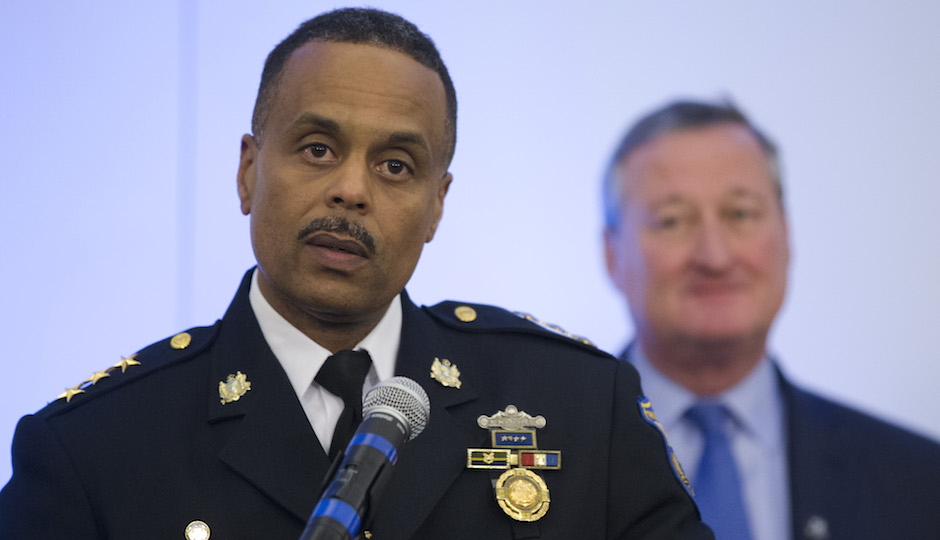The Philly Police Force Is Short About 400 Officers. What Does That Mean?

(AP Photo/Matt Rourke)
What happens when your police force has about 400 fewer cops than expected?
That’s the question we posed to Police Commissioner Richard Ross on Friday, a couple of days after he mentioned the Philadelphia Police Department’s manpower woes while testifying at a City Council budget hearing.
The answer is troubling, at least for anyone who expects the department to respond quickly and creatively whenever the city experiences an unnerving spike in violent crime. (Take this past weekend, for example: at least 14 people were shot across the city, including a 4-year-old girl who died at the hands of her father in Kensington, and a young cop who took a bullet to the leg while trying to arrest a would-be car thief in West Philly.)
In years past, Ross’s predecessors responded to increased bloodshed by flooding crime-plagued neighborhoods with an influx of cops and special units. The anti-crime efforts sounded like military campaigns: Charles Ramsey had Operation Pressure Point, while Sylvester Johnson had Operation Safe Streets.
They also had a hell of a lot more cops to work with. When Johnson was named Philly’s top cop in 2002, the police force had about 7,000 members. Six years later, when Ramsey was handed the reigns to the department, the force had dropped to around 6,700. But Ross said the police force is now down to a little more than 6,100 cops, well below the 6,525 positions that the city can afford. The staffing level is at its lowest point in 22 years.
“Every district is down in manpower. Every unit is down,” Ross said. “When you’re down 400 or so cops, everything is impacted across the board. You don’t get to do those [anti-crime operations] on the same scale.”
Don’t expect much in the way of reinforcements any time soon, either. Ross said there are about 98 recruits who will graduate from the Police Academy by the end of this year. But the department already knows that at least 77 veteran cops are scheduled to retire, and that number will likely grow.
“When I came on the job, we were graduating classes of 100 people for 17 or 18 months consecutively,” he said. “Now we’re looking at graduating less than 100 for the whole year.”
So there are fewer cops walking beats, and fewer detectives investigating violent crimes. “We have to be very judicious about making assignments and where we put people,” Ross said. “Clearly, this will have an impact on our crime-fighting strategies. There aren’t really any dynamic new strategies in policing. You’ve read about all of them: hot spots and smart policing. We do them as well as any other city, but if you don’t have the right number of people to do those things, it’s not going to have the effect that you’re looking for.”
During the Council hearing last week, Ross reiterated his interest in doing away with a requirement for recruits to have 60 college credits or military experience. That mandate was put into place by Ramsey, in response to ongoing corruption problems. As a trade-off, Ross wants to boost the minimum age for recruits from 19 to 22, which theoretically would draw more mature candidates.
Ross hates making a move that might be viewed as regressive. But the numbers don’t lie; he’s got to do something. “It is a very difficult decision to take a standard and essentially lessen it, but we have a mandate to keep people in this city safe,” he said. “I’m a big education guy. I’m not anti-education. But I also know we need people in cars and out on foot beats. And we also have a multitude of folks [who’ve attained] master’s degrees, who came onto this job with virtually no education. This is about being practical about what you can do in the moment.”
The revamped requirements might make it easier for some people to apply to be cops. But Ross is also aware that the policing profession isn’t the most attractive in the world right now. Many cops have complained about the “Ferguson Effect,” the sense that they’re overly scrutinized in the wake of controversial police-involved shootings across the country. The Philadelphia Police Department is still in the process of implementing dozens of use-of-force reforms that were recommended by the U.S. Dept. of Justice. And cops here will no doubt be impacted by the MacArthur Foundation grant the city just received to dramatically lower its prison population in the next few years.
“When I came on the force in April of 1989, I didn’t experience the anti-police sentiment that’s so pervasive throughout our culture today,” Ross said. “That was something that mostly cops in the 1960s had to deal with. The cycle has seemingly repeated itself now, and come full circle.”
Follow @dgambacorta on Twitter.


